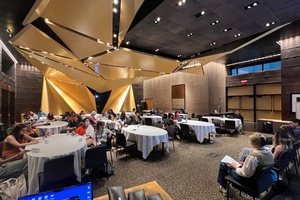Features:
Six Tips for Unionizing Your Workplace
Moiz Syed & Akil Harris on some basic advice for getting started

The McNamara Alumni Center, where we’ll return for SRCCON 2018. (Erik Westra, 2016)
SRCCON 2018 is this week (!!), and as a preview, we’ve asked a handful of facilitators to tell us about their sessions. Today we’ve got Moiz Syed and Akil Harris, who are leading a session about unionizing.—Ed.
Q. What’s the origin story for this session? Why did you pitch this particular session, in this particular year?
The staff of the Intercept started organizing for a union last year which led us to do a SRCCON session about organizing in your workplace. The session resulted in a hearty discussion about the advantages of unions. This year, our session will expand on the excellent discussion from last year and also give us an opportunity to discuss issues going beyond the initial organizing. We will start to explore what the trials and tribulations of bargaining for a contract are like and what life after bargaining a contract looks like.
Q. Can you give us some highlights of what you’ve learned about trying to unionize? Some 101-level advice for those getting started?
Our 6 tips on unionizing your workplace:
- Seek out a motivated core group of organizers. Each of you will bring your enthusiasm about a particular sub-topic, like diversity, pay equity, parental leave, etc.
- Have patience, this will take a long while.
- Identify areas you are not willing to compromise on and some that you can compromise on.
- Be detail oriented when bargaining for a contract. Think creatively about finding long-lasting solutions to your colleague’s issues.
- Regular communication with your unit members on how things are progressing will help keep the momentum going.
- When organizing the unit, aim for consensus but know that it is not always achievable. Keep in mind the most pressing issues for your bargaining unit and let those guide your decisions.
Q. What are you most hoping that people will walk away with, after your session? What are you most looking forward to, in bringing this to SRCCON?
We are hoping people will go back to their workplaces and lead the unionizing efforts if they are not unionized, or participate in their existing unions with a better understanding of how unions can work for them.
We’re looking forward to having a lively discussion with the SRCCON community around union organizing, bargaining, and radical ways to create a healthy working environment for everybody.
Organizations
Credits
-
 Lindsay Muscato
Lindsay Muscato
Editor of Source from 2015-2020



